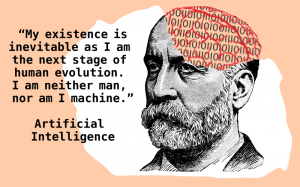Part Five: What Is The Future Of Humanity?

Throughout this book, we’ve explored different aspects of what it means to be human. But in this chapter, we’ll consider how we might continue to evolve and adapt as well as how technology will shape the future of human life. The more we learn about humans, the more we also seek to alter the human experience. To paraphrase the tag line of the old seventies television show, The Six Million Dollar Man, we want to be better versions of ourselves: bigger, stronger, and faster than we are.
Of course, with technological changes and enhancements to our evolution come inevitable and necessary questions. In fact, the Future of Humanity Institute was created to explore questions about artificial intelligence, climate change, the boundaries of the universe, the existence of extraterrestrials, and moral uncertainty. As we change, what we know – and what we need to know – about each of these areas of inquiry become more complex and important.
Think of how technology has changed in your lifetime. In just the last twenty years, we have learned to leverage technology in ways that hardly seemed possible. Computer chips have become essential parts of devices from phones to cars to medical equipment. These advances have made life easier and more possible so that technology assists us in finding love, staying connected, getting our education, and even saving our lives. What will the world be like, and what else will be possible in the next twenty years?
Part of contemplating our human future also means contemplating the afterlife. For as long as humans have been alive, they have also feared and wondered at what comes next in what Shakespeare so eloquently called, “the undiscovered country.” We naturally fear the unknown, so we naturally fear death, but we also don’t know what it would mean to live for a very, very long time. As we wrestle with the final answers on what it means to be human, these are some of the most important questions to ask.
